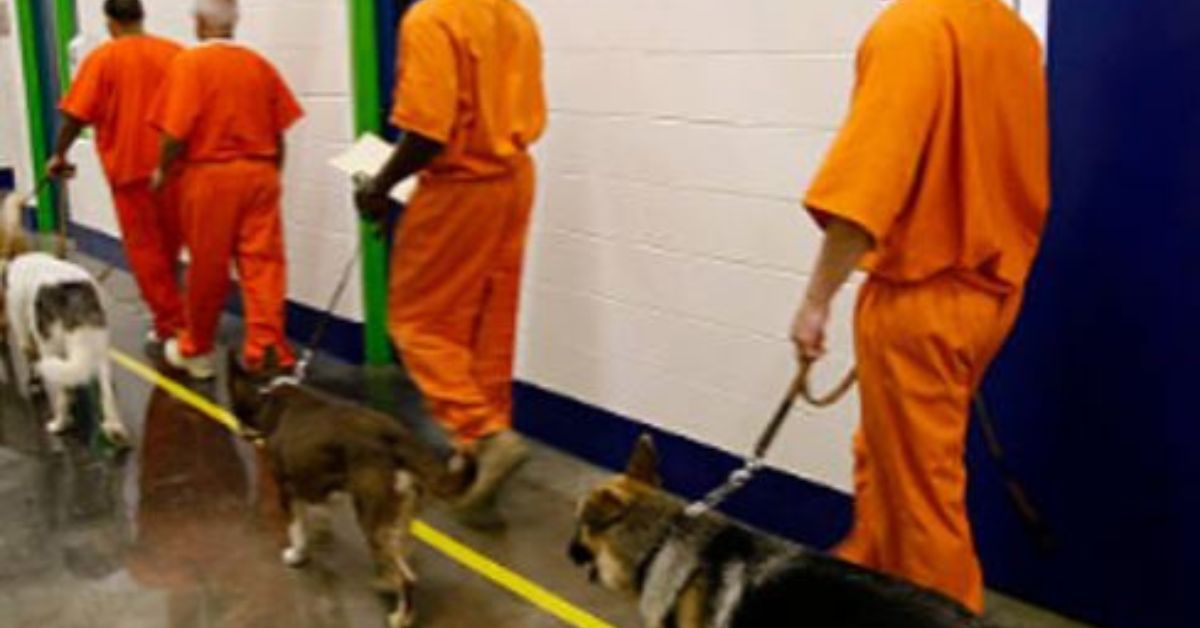At Stars and Stripes Dog Rescue, we are committed to creating second chances—not just for the dogs we rescue, but for the people who train them. Our Prison Dog Training Program is one of the most powerful examples of how the bond between humans and animals can lead to profound, life-changing transformations. This program doesn’t just give rescue dogs a new lease on life; it also offers inmates the opportunity to heal, grow, and prepare for life beyond prison walls. In this blog post, we will explore how prison dog training programs are transforming inmates’ lives in meaningful ways.
1. Building Responsibility and Accountability
Learning to Care for Others
Inmates quickly realize that their actions have direct consequences on the well-being of the dogs. This understanding fosters a deeper sense of empathy and compassion, qualities that are crucial for successful reintegration into society. The daily routine of feeding, grooming, and training the dogs teaches inmates to prioritize the needs of others, a skill that will serve them well in their future relationships and roles.
2. Developing Patience and Self-Control
Channeling Energy into Positive Outcomes
The process of training a dog involves repetition, consistency, and a calm demeanor. Inmates discover that their ability to remain patient and composed directly influences the dog’s progress. This realization often leads to a sense of pride and accomplishment, as they see firsthand the positive outcomes that result from their hard work and self-discipline.
3. Gaining Practical Skills and Vocational Training
Preparing for a Future Beyond Prison
For inmates with criminal records, the vocational training component of the program holds particular significance as it can address the difficulties they may encounter in securing employment. By acquiring skills and experience through the program, they can access new possibilities, paving the way for a more secure and optimistic future. Additionally, engaging in productive and purposeful activities during their time in prison can decrease the likelihood of reoffending, as inmates depart with fresh skills and a revitalized sense of direction.
4. Fostering Emotional Healing and Growth
Mutual Healing Through Bonding
The process of teaching a dog to trust and obey often mirrors the inmates’ journey toward self-forgiveness and healing. The unconditional love and loyalty that dogs provide can help inmates confront and process their own feelings of guilt, shame, or worthlessness. Through this bond, many inmates find a sense of redemption and hope that they may not have believed possible.
5. Enhancing Social and Communication Skills
Building Bridges, Not Barriers
The program encourages collaboration and teamwork among inmates, fostering a sense of camaraderie and mutual respect. Inmates often work together to solve training challenges or share tips and techniques, leading to improved relationships and a more positive prison environment. These enhanced social skills help inmates build healthier relationships with family, friends, and future employers after their release.
6. Providing a Sense of Purpose and Hope
A Pathway to Redemption
Inmates often describe the program as a turning point in their lives—a chance to do something good, to give back, and to find redemption. The success stories that emerge from the program, both canine and human, are a testament to the power of second chances. For many inmates, this experience is the beginning of a journey toward a brighter, more positive future.
At Stars and Stripes Dog Rescue we are proud to support this program and the incredible work being done to rehabilitate both dogs and inmates. The stories of transformation that emerge from our program are a powerful reminder that everyone deserves a second chance. If you are interested in learning more or supporting our mission, we would love to hear from you. Together, we can continue to make a difference—one dog, and one life, at a time.




Leave a Reply